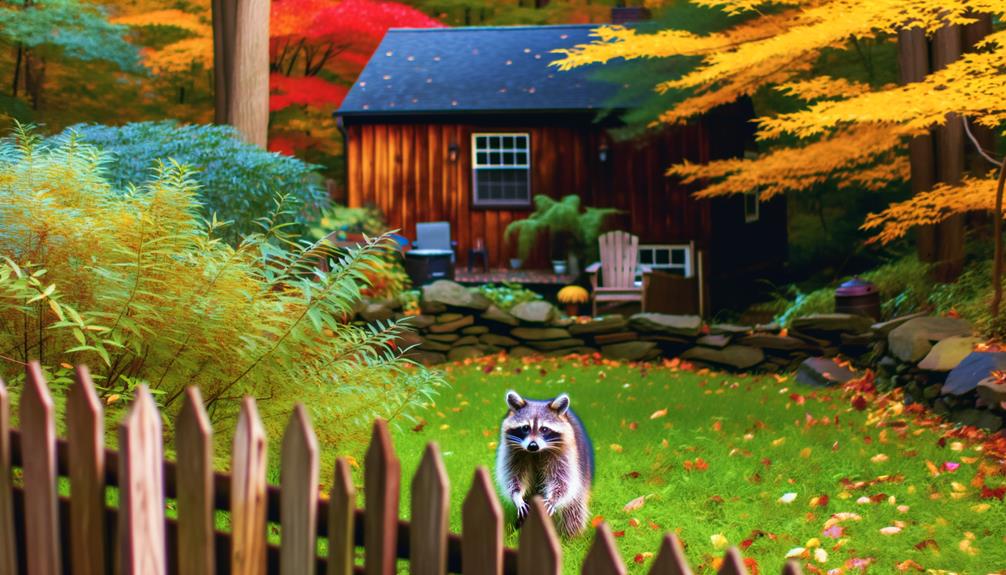How You Can Legally Have a Pet Raccoon in PA
In Pennsylvania, owning a pet raccoon is heavily regulated by state laws. Prospective owners must obtain specific permits and adhere to stringent requirements set by the Pennsylvania Game Commission.
This includes providing detailed documentation on habitat conditions, dietary needs, and health certifications. Proper care involves maintaining a suitable habitat, daily enrichment, and regular veterinary check-ups.
Additionally, raccoons pose significant health risks, including zoonotic diseases such as rabies and leptospirosis. Ethical considerations and the potential impact on local ecosystems further complicate raccoon ownership.
Understanding these detailed requirements and implications is essential before considering a raccoon as a pet in Pennsylvania.

Key Takeaways
- Owning a raccoon in Pennsylvania requires a specific permit from the Pennsylvania Game Commission.
- Applicants must provide detailed documentation, including habitat conditions and health certifications.
- Raccoons are classified as wildlife and require strict management practices and ethical stewardship.
- Owners must meet dietary, habitat, and health standards, including regular veterinary check-ups.
- Raccoons pose health risks, including zoonotic diseases like rabies, necessitating stringent hygiene and vaccination protocols.
Pennsylvania Raccoon Ownership Laws
Exploring the legal terrain of raccoon ownership in Pennsylvania requires a thorough understanding of the state's specific wildlife regulations and licensing requirements.
The Pennsylvania Game Commission enforces stringent laws to protect native wildlife, safeguarding that raccoon ownership does not disrupt local ecosystems. According to the Pennsylvania Code, raccoons are classified as wildlife and are subject to strict management practices.
Prospective owners must be aware that raccoons cannot be captured from the wild without explicit authorization. Moreover, the state mandates that individuals adhere to specific housing, care, and health standards to minimize risks to both the animals and the public.
These laws are designed to promote ethical stewardship and ensure that raccoon ownership aligns with broader conservation goals.
Required Permits and Licenses
To legally own a pet raccoon in Pennsylvania, individuals must navigate a specific permit application process administered by the Pennsylvania Game Commission. This process requires detailed documentation and adherence to state regulations to guarantee the animal's welfare and public safety.
Licensing authorities involved play an essential role in evaluating applications and issuing permits based on compliance with established guidelines.
Permit Application Process
Obtaining a permit to keep a pet raccoon in Pennsylvania involves a detailed application process overseen by the Pennsylvania Game Commission. The procedure entails submitting a thorough form that includes personal information, environmental conditions of the proposed habitat, and health certifications of the raccoon. Additionally, applicants must demonstrate knowledge of raccoon care and provide a contingency plan for the animal's well-being.
| Requirement | Description | Documentation Needed |
|---|---|---|
| Personal Information | Full name, address, and contact details | Proof of residency |
| Habitat Conditions | Description of living environment | Photos and layout plans |
| Health Certifications | Vet check-up and vaccination records | Signed health report |
| Knowledge of Care | Evidence of understanding raccoon behavior | Training certificates or courses |
Ensuring compliance with these requirements is vital for maintaining ethical and legal standards.
Licensing Authorities Involved
The licensing authorities involved in the process of keeping a pet raccoon in Pennsylvania primarily include the Pennsylvania Game Commission and local municipal animal control agencies.
The Pennsylvania Game Commission regulates the ownership of wildlife and requires a permit for anyone wishing to keep a raccoon as a pet. This permit guarantees that the animal is housed in conditions that meet specific health and safety standards.
Concurrently, local municipal animal control agencies may have additional regulations or requirements that must be met. These agencies oversee compliance with local laws and ordinances, which may include inspections and additional permits.
Raccoon Care and Maintenance
Securing the well-being of a pet raccoon in Pennsylvania necessitates a thorough understanding of their dietary needs, habitat requirements, and health care.
Raccoons are omnivores requiring a balanced diet including fruits, vegetables, and protein sources such as eggs and lean meats.
Their habitat should mimic natural conditions; a secure enclosure with climbing structures and hiding spaces is essential.
Daily enrichment activities and interaction are pivotal to prevent boredom and behavioral issues.
Regular veterinary check-ups are essential to monitor their health, with attention to common ailments like parasites and dental problems.
Potential Health Risks
Owning a pet raccoon in Pennsylvania carries several potential health risks that must be carefully considered and managed. Raccoons are known carriers of zoonotic diseases such as rabies, leptospirosis, and raccoon roundworm (Baylisascaris procyonis), which can be transmitted to humans and other animals.
Rabies is particularly concerning due to its fatal nature if untreated. Additionally, raccoons can harbor parasites like fleas and ticks, posing further health risks. Regular veterinary care, stringent hygiene practices, and effective vaccination protocols are vital to mitigating these risks.
Prospective raccoon owners must remain vigilant about monitoring for symptoms and implementing preventive measures to guarantee both human and animal health. Understanding these risks is essential for responsible pet ownership.
Ethical Considerations
Evaluating the ethical considerations of keeping a pet raccoon in Pennsylvania requires a thorough examination of both the animal's welfare and the broader ecological impact. Raccoons are inherently wild animals with specific behavioral, dietary, and environmental needs that are challenging to meet in a domestic setting. Confining a raccoon can lead to stress, behavioral issues, and compromised health.
Additionally, removing raccoons from their natural habitats disrupts local ecosystems, potentially causing imbalances that affect other wildlife. Ethical stewardship mandates respecting the intrinsic nature of raccoons and recognizing the potential harm caused by captivity. Prioritizing the well-being of raccoons and maintaining ecological integrity should guide decisions concerning their domestication.
Alternatives to Owning a Raccoon
Given the ethical concerns associated with keeping raccoons as pets, exploring viable alternatives can help individuals find responsible ways to engage with wildlife.
Volunteer opportunities at wildlife rehabilitation centers provide a hands-on experience with raccoons and other animals in need. These centers often seek assistance with animal care, habitat maintenance, and educational outreach.
Additionally, supporting local wildlife sanctuaries through donations or advocacy helps guarantee the protection and well-being of raccoons in their natural environment.
For those interested in close encounters, participating in guided wildlife tours offers a safe and educational way to observe raccoons.
Conclusion
To sum up, the labyrinthine regulations and extensive care requirements for owning a raccoon in Pennsylvania may deter most prospective pet owners.
Ironically, while the playful allure of these creatures captivates many, it is the stringent legal landscape and potential health risks that ultimately underscore the impracticality of such an endeavor.
Opting for more conventional pets appears not only more prudent but also more conducive to fulfilling the ethical obligations one has toward animal welfare.






